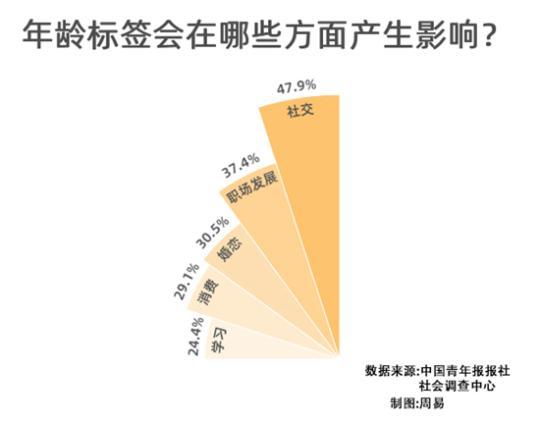More than 60% of respondents care about age-related labels. The post-90s generation cares most
Little sister, little brother, greasy uncle, middle-aged girl... Nowadays, many popular labels are related to age.
Age labels also affect some people's social image and self-perception.
Do you care about age-related labels?
A few days ago, the Social Survey Center of China Youth Daily conducted a survey of 2017 respondents through the questionnaire network (wenjuan.com), which showed that 62.4% of the respondents care about age-related labels, and the post-90s are better than other age groups. Pay more attention to age labels.
Respondents believe that age labels are most likely to affect social and career development.
Respondents think the two most popular tags are Miss Sister and Little Brother
Li Wenxing, 29, is a freelance photographer and often receives orders for personal portraits.
In post-retouching, she sometimes had disagreements with clients.
"I prefer to preserve the characteristics of the subject as much as possible, and modify some of the so-called "shortcomings" through composition and light and shadow. However, many customers want their photos to be repaired to be more perfect and younger, and are afraid to look like the old aunts others call. , Uncle." Li Wenxing thinks that most people still care about age-related tags.
The survey shows that 62.4% of the respondents care about age-related labels, 15.1% and 47.3% are very concerned and 47.3% are more concerned, 35.4% of the respondents don’t care, and 2.2% of the respondents said it’s not good .
In terms of age group, the proportion of respondents born in the 90s who care about age labels is the highest (68.4%), and those born in the 70s are the lowest (54.2%).
After 1985, Fu Zhen (pseudonym) was planning for a private company in Chengdu.
He believes that "youthfulness" and "girlishness" are the most popular nowadays. "Say hello on social software, they are all "little brother" and "little sister". These two titles are often seen in the titles of short videos and live broadcasts. ".
According to the survey, the two most popular labels considered by respondents are young lady (60.8%) and young brother (56.0%), followed by uncle (39.1%), old aunt (38.8%), greasy middle-aged person (37.3) %), aunts (30.0%), old cadres (27.9%), middle-aged girls (27.5%), etc.
Being age-labeled, 30.8% of respondents will feel offended, and 30.3% of respondents will not care
Age labels are everywhere, how do people who are age labels feel?
The survey showed that 30.8% of the respondents would feel offended, 30.3% of the respondents felt indifferent, 25.5% of the respondents accepted it, and 13.4% of the respondents said it was hard to say.
Fu Zhen believes that it is not necessary to be too sensitive to age labels, but some age labels are stereotypes and will indeed have a real impact on life and work.
"I'm quite embarrassed at my age. Talking and doing things too casually may make people feel greasy, and too particular and staid.
In what ways will age labels affect people?
Social (47.9%) ranked first by the respondents, followed by career development (37.4%).
Followed by marriage (30.5%), consumption (29.1%), and study (24.4%).
27.4% of respondents felt that there was no impact.
Li Wenxing, who is going to "Ben San" immediately, is very concerned about the "35-year-old phenomenon in the workplace". "When I was looking for a job, I found that some companies think that youth means a refresher image and more active thinking. More time is devoted to work, and some recruiters directly limit the age of applicants to under 35."
Zhang Kechen (pseudonym), a graduate student at a university in Beijing, feels that young people are also troubled by age labels. “Some units will refuse to use post-95 employees because they feel that they have no longevity and lack of responsibility. people".
Fu Zhen said that everyone has various labels related to age, gender, hometown and other factors. Instead of trying hard to remove the labels, it is better to be calm and to be yourself, and at the same time to be more tolerant and patient with others. Only in this way can others understand themselves more accurately and look at others more objectively.
Among the respondents, the post-00s accounted for 10.0%, post-90s accounted for 37.6%, post-80s accounted for 40.7%, post-70s accounted for 11.2%, and others accounted for 0.5%.
Men accounted for 40.6% and women accounted for 59.4%.
China Youth Daily and China Youth Daily reporter Zhou Yi Source: China Youth Daily

